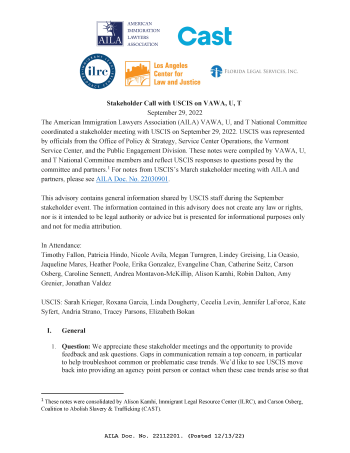
This advisory contains general information shared by USCIS staff during the September 2022 stakeholder event. It contains notes compiled by the American Immigration Lawyers Association (AILA) VAWA, U, and T National Committee and reflects USCIS responses to questions posed by the committee and partners.
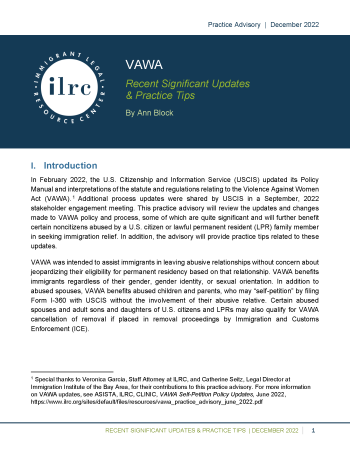
This practice advisory reviews the updates and changes made by USCIS in 2022 to VAWA policy and process related to self-petitioners, and includes related practice tips.
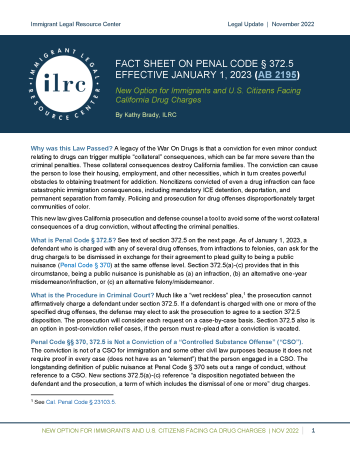
his fact sheet describes new Cal. Penal Code 372.5 (AB 2195). As of January 1, 2023, a California defendant who is charged with any of several drug offenses, from infractions to felonies, can ask for the drug charge/s to be dismissed and instead to plead guilty to being a “public nuisance” (Penal Code § 370). Section 372.5 provides that in this circumstance, the public nuisance offense is punishable as an infraction, a misdemeanor, or a “wobbler” offense, depending on the offense level of the drug charge that was dropped. The defense must decide to ask, and the prosecution must agree, to go forward with Penal Code 370/372.5.
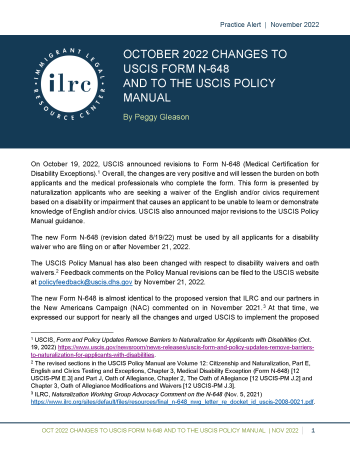
This alert describes recent changes to the naturalization disability waiver. On October 19, 2022, USCIS announced major revisions to the Form N-648, which is used by naturalization applicants who seek a waiver of the English and/or civics requirement based on a disability or impairment that causes the applicant to be unable to learn or demonstrate knowledge of English and/or civics. USCIS also published major changes to the accompanying USCIS Policy Manual guidance.
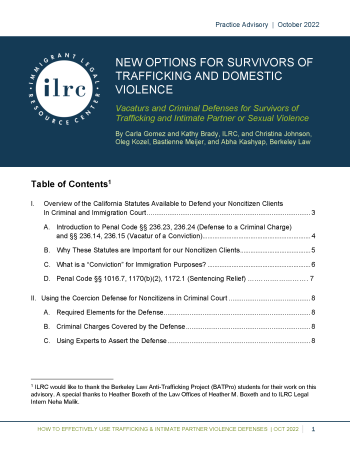
Survivors of human trafficking and of domestic or sexual violence often are charged and convicted of offenses that arose as a direct result of their exploitation. For noncitizens, the criminal record can cause deportation or destroy their eligibility for humanitarian visas. In the last five years, California has enacted multiple laws to avoid this injustice in criminal court, including a defense to a criminal charge and a vehicle to vacate a past conviction for survivors who were coerced to commit the offense, or in other cases mitigation of sentence. This advisory describes the new criminal laws and their immigration effect, so that criminal defenders and immigration and survivor advocates are aware of these options.
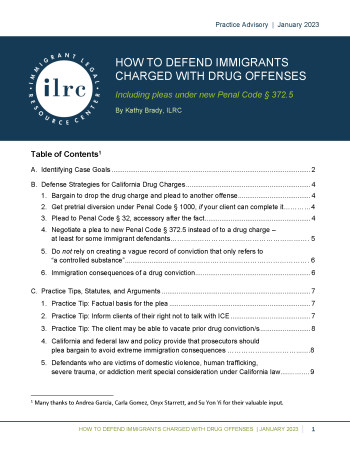
Drug offenses cause the harshest, most disproportionate immigration penalties of any offense. Criminal defenders and immigration advocates need information to work aggressively to defend immigrant clients. This advisory provides strategies to avoid a drug conviction, including how and when to use Penal Code § 372.5 (2023), along with practice tips, resources, and arguments to support negotiating for an immigration neutral plea or disposition in criminal court.
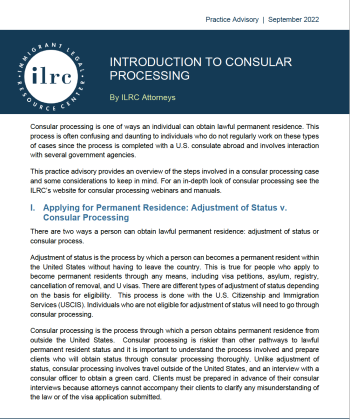
Consular processing is one of ways an individual can obtain lawful permanent residence. This process is often confusing and daunting to individuals who do not regularly work on these types of cases since the process is completed with a U.S. consulate abroad and involves interaction with several government agencies. This practice advisory provides an overview of the steps involved in a consular processing case and some considerations to keep in mind.

This practice advisory outlines the requirements and process of enrolling in Temporary Protected Status (TPS) for the first time. It provides an overview of the basic requirements for TPS and identifies red flag issues that require careful analysis. It provides guidance on the TPS application process, including preparing a waiver of inadmissibility. It also offers practical guidance about when to file in immigration court and when an eligible individual may qualify for late initial registration.
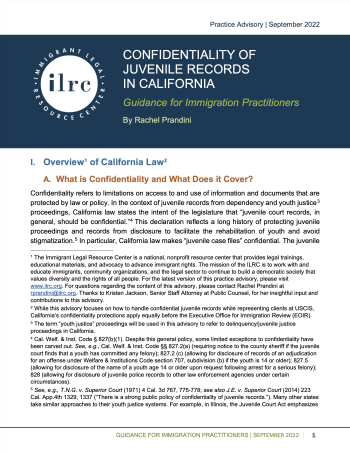
California has strict confidentiality laws that govern when and to whom records from dependency and youth justice (delinquency) proceedings may be released. Immigration advocates need to be aware of these laws and ensure they are complied with when representing individuals with California juvenile records. This guide provides an overview of the law and practical guidance for how to handle issues of juvenile confidentiality before USCIS.
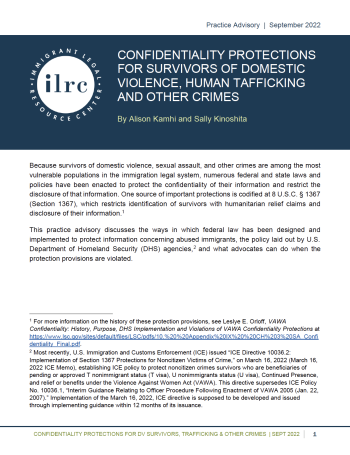
Because survivors of domestic violence, sexual assault, and other crimes are among the most vulnerable populations in the immigration legal system, numerous laws and policies have been enacted to protect the confidentiality of their information and restrict the disclosure of that information. One source of important protections is codified at 8 U.S.C. § 1367 (Section 1367), which restricts identification of survivors with humanitarian relief claims and disclosure of their information.[1] This practice advisory discusses the ways in which federal law has been designed and implemented to protect information concerning abused immigrants, the policy laid out by U.S. Department of Homeland Security (DHS) agencies, and what advocates can do when the protection provisions are violated.